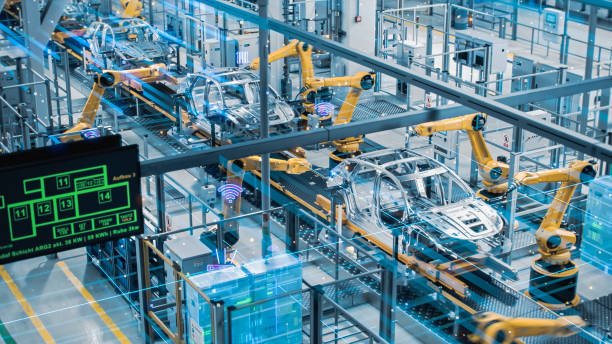Modular Production Systems: Redefining Manufacturing Flexibility
Modular production systems are revolutionizing the manufacturing landscape, offering unprecedented flexibility and efficiency in an era of rapidly changing consumer demands. This innovative approach to industrial operations allows companies to quickly adapt their production lines, scale output, and introduce new products with minimal disruption. By embracing modularity, businesses can stay agile in competitive markets while optimizing resource utilization and reducing operational costs.

The Evolution of Manufacturing Flexibility
The concept of flexible manufacturing has been around for decades, but modular production systems represent a significant leap forward. Traditional manufacturing setups often required extensive downtime and substantial investments to modify production lines. In contrast, modular systems are designed with change in mind, featuring standardized interfaces and plug-and-play components that can be swapped out or rearranged with minimal disruption.
This evolution began in the automotive industry, where modular assembly lines allowed for greater customization and efficiency. Today, the concept has spread across various sectors, from electronics to pharmaceuticals, reshaping how companies approach production planning and execution.
Core Components of Modular Production Systems
At the heart of modular production systems are several key components that work together to create a flexible and efficient manufacturing environment:
-
Standardized Modules: These are self-contained units that perform specific functions within the production process. They can be easily connected or disconnected from the main system.
-
Intelligent Control Systems: Advanced software and control systems manage the interactions between modules, optimizing workflow and ensuring seamless integration.
-
Flexible Conveyor Systems: Adaptable conveyor systems allow for quick reconfiguration of material flow between modules.
-
Plug-and-Play Interfaces: Standardized connections enable rapid integration of new modules or replacement of existing ones without extensive rewiring or reprogramming.
-
Scalable Infrastructure: The underlying support systems, including power, data, and utilities, are designed to accommodate changes in layout and capacity.
Benefits of Implementing Modular Production
The adoption of modular production systems offers numerous advantages for manufacturers:
-
Increased Agility: Companies can quickly adapt to market demands by reconfiguring their production lines or introducing new product variants.
-
Reduced Downtime: Maintenance and upgrades can be performed on individual modules without shutting down the entire production line.
-
Cost Efficiency: The ability to reuse and repurpose modules reduces the need for large capital investments when introducing new products or processes.
-
Improved Quality Control: Standardized modules with built-in quality checks ensure consistent output across different configurations.
-
Enhanced Customization: Modular systems facilitate mass customization by allowing for easy product variations without significant retooling.
Challenges and Considerations
While the benefits of modular production systems are significant, implementation comes with its own set of challenges:
-
Initial Investment: The upfront cost of transitioning to a modular system can be substantial, requiring careful cost-benefit analysis.
-
Standardization Hurdles: Developing standardized interfaces and ensuring compatibility across different modules and suppliers can be complex.
-
Workforce Training: Employees need to be trained to work with modular systems, which may require new skills and a different mindset.
-
System Complexity: Managing a highly flexible system requires sophisticated planning and control systems, which can increase operational complexity.
-
Balancing Flexibility and Efficiency: While modularity offers flexibility, it’s crucial to strike a balance with overall system efficiency and throughput.
Case Studies: Modular Success Stories
Several companies across industries have successfully implemented modular production systems, reaping significant benefits:
-
Automotive Giant: A leading car manufacturer implemented a modular assembly line that reduced model changeover time by 50% and increased production flexibility by 30%.
-
Consumer Electronics Leader: A smartphone producer adopted a modular approach, enabling them to introduce new models 25% faster and reduce production costs by 15%.
-
Pharmaceutical Innovator: A drug company’s modular production facility allowed for rapid switching between different product lines, increasing overall equipment effectiveness by 20%.
These case studies demonstrate the tangible benefits of modular production systems across diverse industries, highlighting their potential to drive innovation and operational excellence.
Practical Insights for Implementing Modular Production
• Start small: Begin with a pilot project to test the concept and gain experience before full-scale implementation.
• Focus on standardization: Develop clear standards for module interfaces and communication protocols to ensure seamless integration.
• Invest in workforce development: Provide comprehensive training to help employees adapt to the new modular approach.
• Collaborate with suppliers: Work closely with equipment suppliers to ensure compatibility and support for modular systems.
• Leverage data analytics: Implement robust data collection and analysis systems to optimize module performance and overall system efficiency.
• Plan for scalability: Design your modular system with future growth and changes in mind to maximize long-term flexibility.
In conclusion, modular production systems represent a paradigm shift in manufacturing, offering unprecedented flexibility and efficiency. As industries continue to face rapid changes and increasing demand for customization, the ability to adapt quickly becomes a crucial competitive advantage. By embracing modularity, companies can position themselves at the forefront of manufacturing innovation, ready to meet the challenges of today’s dynamic market landscape. The journey towards modular production may be complex, but the potential rewards in terms of agility, efficiency, and competitiveness make it a compelling strategy for forward-thinking manufacturers.






